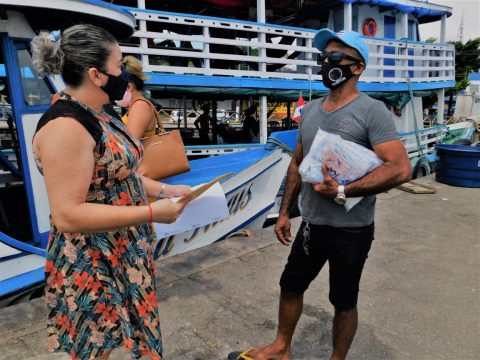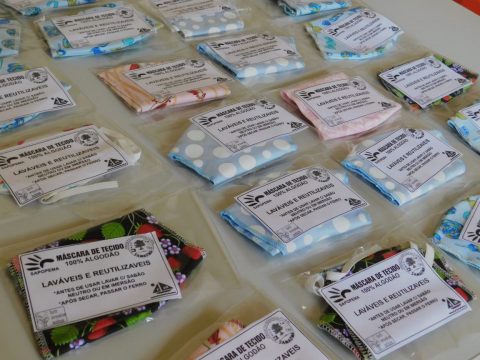EII partner donates 2,000 face masks to fishing communities in Brazil
Residents of floodplain communities surrounding the Brazilian port city of Santarém, which sits at the juncture of the Tapajós and Amazon rivers in the state of Pará, recently received more than 2,000 face masks as part of an effort to support local families quarantined during the coronavirus pandemic. The masks are part of a campaign led by EII partner, Sapopema, which works to support sustainability and economic well-being for fishing communities in the region
The reusable masks arrived in early May and come as the city braces for an expected increase in cases of COVID-19, the disease associated with the virus. Brazil has become a global hotspot for reported cases and deaths related to the pandemic, with more than 350,000 confirmed cases to date.

Sapopema’s Wandicleia Lopes helped deliver the first batch of masks and described an emotional response from community residents. “Of all the activities we carry out in the communities, this is one of the most meaningful,” she said.
Currently, there are approximately 750 confirmed cases of coronavirus in the city of Santarém, where the fishing industry is an important part of the regional economy. EII and Sapopema work with the Santarém Fisher Union, Z-20 and floodplain communities to develop sustainable management regulations for local fisheries.
Santarém’s residents remain fearful of exposure and are limiting public interactions in an effort to slow the virus’ spread. The result has been a dramatic drop in economic activity, impacting fishing communities in the city’s low-lying floodplains that rely on daily sales of fresh caught fish for their income.
“The [economic] impacts are huge,” explained João Mário, a director of Santarém’s Fishers’ Union, which is partnering with Sapopema to distribute the masks. “Many communities have been cut off by the pandemic. They are hard to reach and have only a few boats for people to use to pick up essentials.”

The masks were produced for Sapopema by the group Samauma, which specializes in Amazonian crafts. Families in communities that Sapopema works with will each receive two masks. Distribution is scheduled to continue through May and Sapopema expects to distribute the masks to more than 1,000 families.
The effort is one example of how rural organizations in Brazil are stepping in to control the spread of the virus and support local communities amid a fractured response to the pandemic at the national level. In the state of Acre, state and local organizations banded together to create a first-of-its kind online delivery service for women producers struggling to sustain an income after outdoor markets were closed there.
The first batch of masks was delivered earlier this month to the community of Aracampina by Joelson Santos, coordinator of the Ituqui Chapter Z-20, another Sapopema partner.
“The community is trying to follow safety protocols,” he said, “but some fishermen need to come to the city to sell their fish to receive an income. That’s why everyone needs to be protected.”
Economic necessity is prompting many rural and urban fishers to continue fishing despite the risks of exposure. While not a guarantee against infection, the masks will help to slow the spread for those continuing to work through the pandemic.
Sapopema Director Antônio José Bentes noted the communities receiving the masks are those that work with the organization to mobilize and support local fisheries management agreements in the municipality of Santarém. Distribution of the masks, he noted, is part of Sapopema’s wider mission to promote the “conservation of fishing resources in the region through fishing agreements and sustainable use of these resources.”
Funding for the production and purchase of the masks comes through a grant from the Norwegian Agency for Development and Cooperation (NORAD) and the Tinker foundation.
